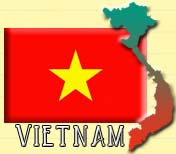Investors in Vietnam converting their savings to Vietnamese dong
 Hanoi- While the global financial crisis has driven investors around the world to buy dollars in a flight to quality, depositors in Vietnam have been doing the opposite recently, shifting money from dollars into Vietnamese dong, bank officers said Monday.
Hanoi- While the global financial crisis has driven investors around the world to buy dollars in a flight to quality, depositors in Vietnam have been doing the opposite recently, shifting money from dollars into Vietnamese dong, bank officers said Monday.
For years, Vietnamese have preferred to save money in dollar-denominated accounts as a hedge against inflation and declines in the value of the dong. But that has begun to change.
"Most Vietnamese people have been depositing their money in dong rather than dollars in recent days," said Hoang Khac Hanh, head of the transactions department at Vietnamese joint-stock bank BIDV.
Hanh said the reason was the high rate of interest on dong accounts, currently 16 per cent or more. Interest on dollar-denominated accounts is roughly 6 per cent.
Interest rates on dong-denominated accounts are high due to attempts by Vietnam's State Bank to fight spiraling inflation, which rose to 27 per cent year-on-year in August. In response, the State Bank raised the prime interest rate to 14 per cent.
Banks also needed to offer high interest rates to attract dong deposits in the face of fears of weakness in the dong. In late spring analysts worried that Vietnam's trade deficit, now projected to reach 19 billion dollars in 2008, could lead to a catastrophic devaluation of its currency.
But government inflation-fighting efforts appear to have succeeded, as inflation dropped to a monthly rate of just 0.18 per cent in September. And the State Bank's high foreign exchange reserves have allowed it to keep the dong's exchange rate stable for months, at roughly 16,600 to the dollar.
"Previously everyone was jumping into dollars expecting the dong to go up to 18,000," said economist Adam McCarty of Mekong Economics. "The government's knocked that on the head. So now they're going back into dong, because if you don't expect the exchange rate to move much, you're getting a lot more interest in dong."
Nguyen Ngoc Bao, director of the State Bank's Monetary Policy Department, agreed that the stable exchange rate and low inflation were the main reasons for the shift to dong, but said sentiment about the US economy also plays a role.
"I think it is reasonable, because if the US economy is in recession, the dollar value decreases," Bao said.
Several economists said this could be misguided, as recession in the US will likely damage Vietnam's export-oriented economy as well.
Still, as consumers have been shifting from dollars to dong, some banks have been doing the same.
Rumours have spread in the past two weeks that Vietnamese private banks were pulling their holdings out of the US to reinvest them in Asia.
On Monday, news website VnExpress reported that the CEO of Vietcombank, the country's fourth largest lender, confirmed in an interview that the bank had withdrawn 40 per cent of the funds it had deposited with banks in the US and Europe to reduce its exposure to the global financial crisis.
"On October 3, the prime minister released a document asking banks to check their deposits at foreign banks," the site quoted Vietcombank's Nguyen Phuoc Thanh as saying. "One week later, Vietcombank closed some of its accounts and took back mature deposits."
Thanh said the funds had mainly been invested with the State Bank of Vietnam.
Economists agreed that the Vietnamese economy faces substantial risks in the medium term. The global credit crunch threatens Vietnam's ability to raise capital to invest in its export-oriented industries, while recessions in wealthy economies threaten to shrink those exports themselves.
But in contrast to other economies at this moment of uncertainty, many of Vietnam's depositors are reacting by moving into dong.
"The rest of the world's pouring into dollars," said McCarty. (dpa)